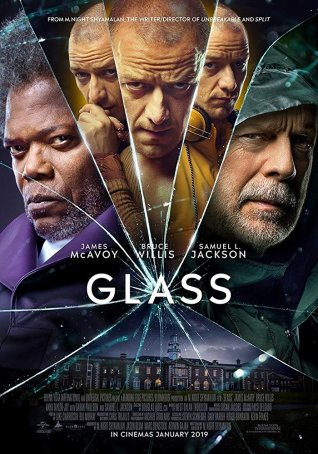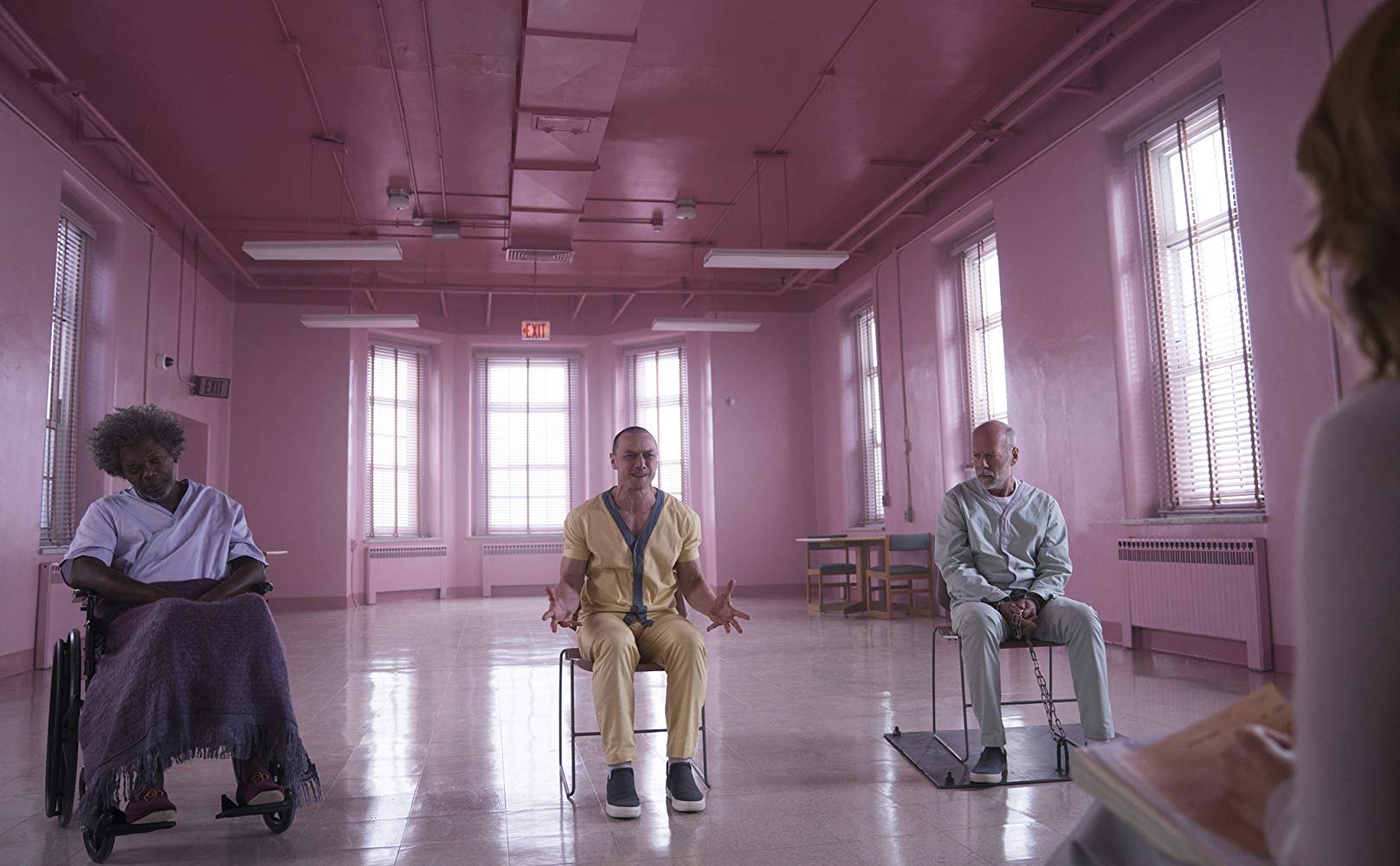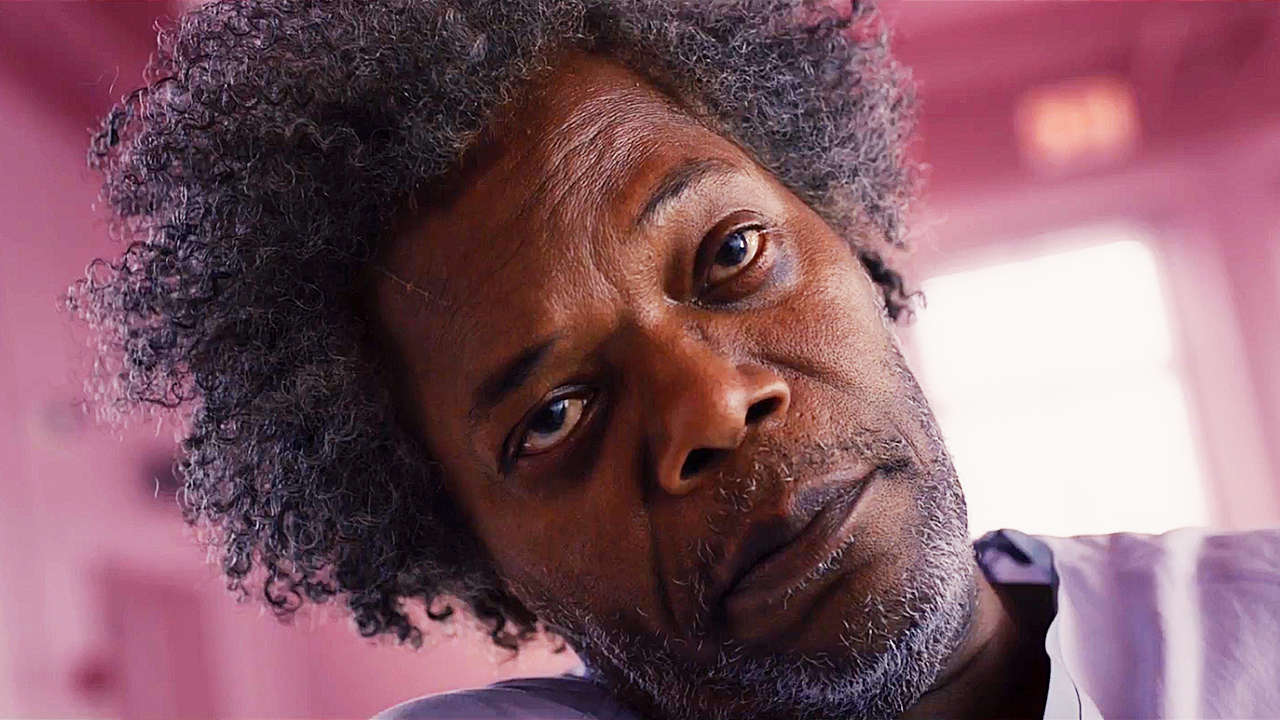Glass (United States, 2019)
January 16, 2019
The best element of M. Night Shyamalan’s 2017 horror film, Split – and one of the few things it did
right – happened at the very end. The brief, surprising reveal of Bruce Willis reprising
his David Dunn character from Unbreakable
created a shared universe that Shyamalan was all-too-eager to exploit.
Unfortunately, there’s a wide gulf between teasing fans with a momentary appearance
and building a story around it. Glass,
the third film in what has become a trilogy, comes across as a mix of half-formed
ideas baked into an uneven casserole. Overlong, talky, filled with meta references, and with a strangely low-energy tone, the movie never fully gels.
To give Shyamalan credit, he’s not content to do a paint-by-numbers comic book movie but his ambitions exceed his abilities. In trying to develop themes about the differences between fantasy and reality and create a “grounded” superhero movie, he adds in characters who are either tangential, boring, or both. The interplay among the three leads – James McAvoy’s The Beast, Willis’ Dunn, and Samuel L. Jackson’s Mr. Glass – is disappointingly perfunctory. McAvoy and Willis spend some time pounding on each other but, beyond that, there isn’t much. Dunn and Mr. Glass have minimal interaction and, although Glass spends some time with The Beast, it’s not especially meaningful.
 Glass picks up an
unspecified time after Split. The
multi-personality Kevin Crumb, now dominated by the superhuman Beast, is once
again kidnapping girls. Security guard David Dunn, who works with his son,
Joseph (Spencer Treat Clark), has become Philadelphia’s Batman – a shady
vigilante who wanders the streets handing out justice without due process. He’s
on the search for Crumb and, when he finds him, there’s a showdown that ends
with both of them being taken into custody. They are transported to a maximum-security
asylum to occupy rooms alongside a third special prisoner – Elijah Price a.k.a.
Mr. Glass. The three are to be treated by Dr. Ellie Staple (Sarah Paulson), a
psychiatrist who specializes in “superhero delusions.” Her goal is to convince her
patients that there’s a difference between comic books and reality and no one
in the “real world” has superpowers. Of course, she underestimates the three
men and, while she lectures, the seemingly catatonic Mr. Glass teams up with
The Beast and sets up a situation that forces Dunn’s hand.
Glass picks up an
unspecified time after Split. The
multi-personality Kevin Crumb, now dominated by the superhuman Beast, is once
again kidnapping girls. Security guard David Dunn, who works with his son,
Joseph (Spencer Treat Clark), has become Philadelphia’s Batman – a shady
vigilante who wanders the streets handing out justice without due process. He’s
on the search for Crumb and, when he finds him, there’s a showdown that ends
with both of them being taken into custody. They are transported to a maximum-security
asylum to occupy rooms alongside a third special prisoner – Elijah Price a.k.a.
Mr. Glass. The three are to be treated by Dr. Ellie Staple (Sarah Paulson), a
psychiatrist who specializes in “superhero delusions.” Her goal is to convince her
patients that there’s a difference between comic books and reality and no one
in the “real world” has superpowers. Of course, she underestimates the three
men and, while she lectures, the seemingly catatonic Mr. Glass teams up with
The Beast and sets up a situation that forces Dunn’s hand.
One of the problems with Glass is Sarah Paulson’s character. Despite playing a crucial role, Dr. Staple is neither interesting nor dynamic. She’s afflicted with verbal diarrhea and likes hearing herself pontificate about her philosophy of the demarcation line between what’s real and what isn’t. The movie also brings back three other characters – Joseph, Elijah’s mother (Charlayne Woodard), and one of Crumb’s victims, Casey Cooke (Anya Taylor-Joy) – who don’t seem to belong. Shyamalan might as well have put a neon sign over them all saying: “Be Patient. They’ll Eventually Be Important.”
 Glass’ superhero
elements, although developed by someone who clearly understands comic books
(although perhaps not as well as Kevin Smith), don’t impress. The action sequences
aren’t well choreographed and lack the verve and energy of the more established
franchises. This being Shyamalan’s work, there are twists but they’re not on the
Sixth Sense level. Clever red
herrings aside, it’s a little disappointing that the story is so straightforward.
There’s a lack of visceral satisfaction in how things wrap up (although one can
make an argument that it’s intellectually effective).
Glass’ superhero
elements, although developed by someone who clearly understands comic books
(although perhaps not as well as Kevin Smith), don’t impress. The action sequences
aren’t well choreographed and lack the verve and energy of the more established
franchises. This being Shyamalan’s work, there are twists but they’re not on the
Sixth Sense level. Clever red
herrings aside, it’s a little disappointing that the story is so straightforward.
There’s a lack of visceral satisfaction in how things wrap up (although one can
make an argument that it’s intellectually effective).
When I wrote my negative review of Split two years ago, one of the few things I praised about the film was McAvoy’s performance, saying that he “takes center stage with his deliciously over-the-top representation of about a dozen personalities… He goes all-out with a gusto that at times almost makes Split watchable.” If anything, McAvoy is more mesmerizing this time around, expanding the number of characters he portrays. He interacts with himself better than with his co-stars and manages the seemingly-impossible task of stealing the spotlight from the magnetic Jackson (who is unusually subdued). Bruce Willis plays Dunn as tired, worn-out, and world-weary – a facet that borrows a little John McClane and combines it with Hugh Jackman from Logan.
For me, Unbreakable offered a clever twist to the then-developing superhero genre. Split was a horror film failure. Glass falls somewhere in between the two – a transparent attempt by Shyamalan to seize the moment and bring back popular characters but, lacking a compelling story, he instead substituted half-finished ideas. It’s watchable but underwhelming and, although there are avenues another installment could explore, Glass offers a tidy conclusion to the stories of these characters in this universe.
Glass (United States, 2019)
Cast: James McAvoy, Bruce Willis, Samuel L. Jackson, Sarah Paulson, Anya Taylor-Joy, Spencer Treat Clark, Charlayne Woodard
Home Release Date: 2019-04-16
Screenplay: M. Night Shyamalan
Cinematography: Mike Gioulakis
Music: West Dylan Thordson
U.S. Distributor: Universal Pictures
U.S. Release Date: 2019-01-18
MPAA Rating: "PG-13" (Violence)
Genre: Science Fiction
Subtitles: none
Theatrical Aspect Ratio: 2.35:1
- Atonement (2007)
- X-Men: Days of Future Past (2014)
- Chronicles of Narnia, The: The Lion, the Witch and the Wardrobe (2005)

Comments